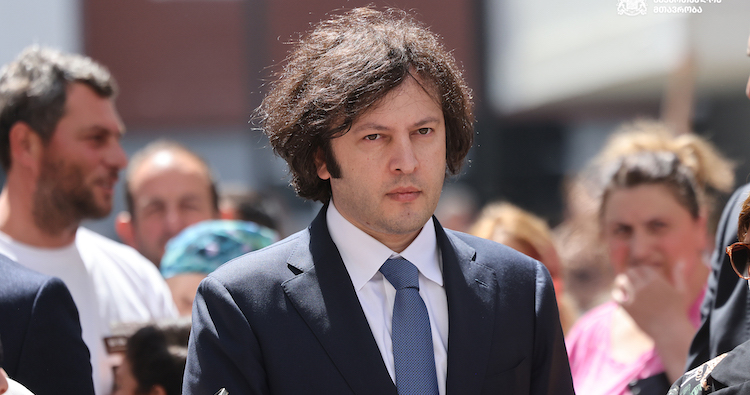Georgian PM: transparency law designed to “prevent poverty, revolution, disorder, opening of second front”

Georgian Prime Minister Irakli Kobakhidze on Wednesday claimed the newly adopted law on transparency of foreign influence would serve to “prevent poverty, revolution, disorder and [opening of] a second front” in Georgia amid the war in Ukraine. Photo: Gov't Administration
Georgian Prime Minister Irakli Kobakhidze on Wednesday claimed the newly adopted law on transparency of foreign influence would serve to “prevent poverty, revolution, disorder and [opening of] a second front” in Georgia amid the war in Ukraine.
Kobakhidze said the Government would “not allow Maidan and Ukrainisation” to take place in the country, in reference to the protests in Kyiv in 2013-2014 that resulted in the Maidan Revolution in Ukraine], and claimed the hypothetical scenario would bring about “economic decline”, among other outcomes.
We are constantly reminded of the Maidan, and I want to remind you of what it brought to Ukraine. During that time, the Government was appointed from outside, and when this happens, those responsible have to take responsibility for the country”, he said.
However, we all know what happened in Ukraine - prior to Maidan, Ukraine was a country with territorial integrity and was on the path to economic growth, with an economy of almost $200 billion. Now, the country is in ruins, the economy is in the worst possible state and 20 percent of its territories are occupied by Russia. A total of 10,000 people have died, including hundreds of children. The question is: who is responsible for this?”, Kobakhidze added.
Today, as we speak about the Maidan in the context of Georgia, we must consider the responsible parties for the aftermath of the Maidan in Ukraine and the potential impact of similar events on Georgia. We will not allow this to happen in our country”, he said.
The Prime Minister also told a reporter from the opposition-leaning TV Pirveli it was “your political party” - in reference to the United National Movement - that had “brought Russian tanks to Georgia” in 2008 and “surrendered 20 percent of the country” as a result of the war between the two countries.
He said “only the collective National Movement should be afraid of sanctions”, amid ongoing discussions about potential sanctions on the ruling Georgian Dream party following its approval of the controversial law.
Kobakhidze also invited “those with complaints” for a public discussion and rejected “any unfounded criticism”. “I presented the law and offered a public discussion, but no one engaged in it. This suggests there are no compelling counterarguments”, the Prime Minister said.
Approved last month, the law requires registration of non-commercial legal entities and media outlets in the country as “pursuing the interests of a foreign power” if they derive more than 20 percent of their funding from abroad.
The law has been met by criticism from Georgia's foreign partner governments and public protests across the country.
 Tweet
Tweet  Share
Share